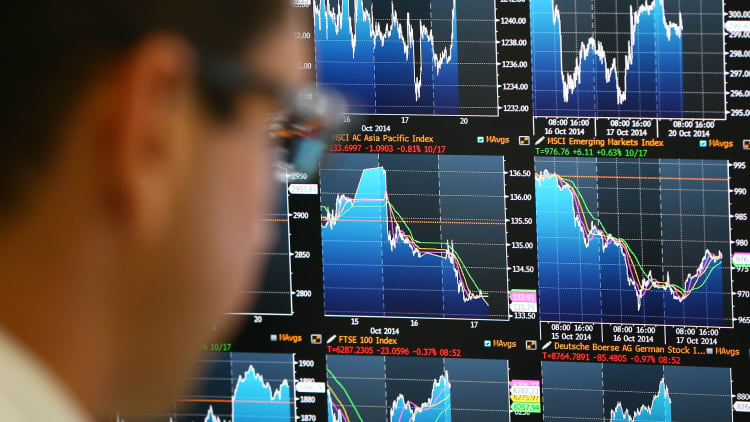
U.S. stocks mainly declined on Tuesday, a day after benchmarks rose to records, as the price of oil slid to a three-year low and Americans cast ballots in midterm elections.
"What we're seeing today is a little bit of anxiousness over the elections, which tend to spook investors," said David Lebovitz, global market strategist for J.P. Morgan Funds.
In congressional elections being held across the nation, Republicans were expected to increase their numbers in the House and Senate, although whether the GOP garners enough seats to take control of the latter body was viewed as too close to call.
Read MoreMarket predicting more GOP gains than polls
The CBOE Volatility Index, a gauge of investor uncertainty, rose 1.1 percent to 14.89.
Brent crude fell to a multi-year low after Saudi Arabia lowered the price of oil exported to the United States, while increasing the cost to Asia and Europe.
"Lower oil prices negatively impact oil companies, but on the other hand, it's a positive for the U.S. consumer. So, energy stocks are taking it on the chin, but in a consumer-driven economy like the U.S., it's more important for the U.S. consumer to have more disposable income," Lebovitz added.
"I hoped the $81 I saved at the gas pump this morning is wisely spent so I can offset the thousands I'm losing on my energy names," quipped Elliot Spar, market strategist at Stifel, Nicolaus & Company, in emailed commentary.
The European Commission reduced its estimates for euro-zone growth, projecting the 18-nation region's gross domestic product would climb by 0.8 percent in 2014 and 1.1 percent next year, a decline from estimates of 1.2 and 1.7 percent.
Read MoreMarket weakens on European Central Bank fight
The Commerce Department reported U.S. 0.6 percent in September.
A separate report Tuesday had the trade gap expanding in September as exports slowed from a record, illustrating the impact of softer global growth on the U.S. economy.
"There are three things we're struggling with today: a lower assessment of the European economy, it's down from where they were six months ago; the sufficiently lower price in oil, and whether it's a supply issue or is it speaking to global demand, and then we're in a wait-and-see mode as we look at polling results, we may not even know tomorrow with certain key elections," said Art Hogan, chief market strategist at Wunderlich Securities.
Major U.S. Indexes
Erasing losses, the Dow Jones Industrial Average rose 17.60 points, or 0.1 percent, to 17,383.84, with Procter & Gamble leading blue-chip gains and Caterpillar the losses.
JPMorgan Chase also weighed on the Dow after the bank disclosed the Department of Justice was conducting a criminal probe of its foreign-exchange business.
The dropped 5.71 points, or 0.3 percent, to 2,012.10, with energy hardest hit and consumer staples the best performing of its 10 major sectors.
On Monday, both the Dow and S&P 500 advanced to intraday records before closing in the red.
The Nasdaq declined 15.27 points, or 0.3 percent, to 4,623.64.
For every two shares rising, three fell on the New York Stock Exchange, where nearly 833 million shares traded. Composite volume topped 3.9 billion.
On the New York Mercantile Exchange, December oil futures dropped $1.59 to $77.19 a barrel, and gold futures for December delivery fell $2.10, or 0.2 percent, to $1,167.70 an ounce.
"The recent collapse in commodity prices is driven not only by a stronger dollar, but also by fears of global economic weakness. The shift lower in commodity prices represents a significant challenge to stimulus measures from other leading central banks now that the Federal Reserve has turned to a neutral stance," offered Andrew Wilkinson, chief market analyst at Interactive Brokers.
"The crush in crude oil is unnerving for many participants. When will it stop? After a reversal or key-reversal day or when the price war has done enough damage to cut off some supply," offered Spar at Stifel, Nicolaus.
The U.S. dollar gained against the currencies of major trading partners, and the yield on the 10-year Treasury note used to figure mortgage rates and other consumer loans held at 2.3347 percent.
U.S. stocks mostly declined on Monday, with Chevron and Exxon Mobil among the blue chips hit as the price of crude fell to a more than two-year low.

Coming Up This Week:
Tuesday
Mid-term elections
Wednesday
Earnings: Time Warner, Tesla, Mondelez, Qualcomm, CBS, Toyota Motors, Tim Hortons, Holly Frontier, ING Group, Chesapeake Energy, Duke Energy, Towers Watson, Lamar Advertising, Rowan Cos, NRG, Scotts Mircale-Gro, Whole Foods, Tesla Motors, News Corp, Soar City, Zillow
8:15 a.m.: ADP employment
9:15 a.m.: Minneapolis Fed President Narayana Kocherlakota
9:30 a.m.: Richmond Fed President Jeffrey Lacker
10:00 a.m.: Boston Fed President Eric Rosengren
10:00 a.m.: ISM nonmanufacturing
Thursday
Earnings: Disney, AstraZeneca, Siemens, AOL, AMC Networks, Molson Coors Brewing, Advance Auto Parts, First Solar, Cablevision, Echostar, Henry Schein, Apache, Scripps Networks, Wendy's El Pollo Loco, Lionsgate, Zynga, Biocryst Pharma, Cablevision, Enbraer, Calpine, Windstream, Con Ed, Tekmira
European Central Bank meets
Monthly chain store sales
8:30 a.m.: Initial claims
8:30 a.m.: Productivity and costs
10:40 a.m.: Chicago Fed's Evans
7:05 p.m.:Cleveland Fed President Loretta Mester
Friday
Earnings: Berkshire Hathaway, Allianz, Nippon Telegraph, ArcelorMittal, Humana
8:30 a.m.: Employment report
9:15 a.m.: Chicago Fed's Evans
10:15 a.m.: Fed Chair Janet Yellen on policy in Paris
1:00 p.m.: Chicago Fed's Evans
2:30 p.m.: Fed Vice Chair Daniel Tarullo
3:00 p.m.: Consumer credit
More From CNBC.com:


